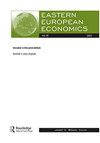对新冠肺炎的恐惧是如何影响中欧和东欧获得医疗保健的?疫情爆发后50岁或以上人群的调查结果
IF 1.2
4区 经济学
Q3 ECONOMICS
引用次数: 3
摘要
摘要本文探讨了来自八个中东欧国家的50岁或50岁以上人群的特征,他们报告称因担心新冠肺炎而放弃医疗保健。13033人的样本基于SHARE Corona调查的数据以及前几波的数据。我们对医疗回避进行了多变量逻辑回归模型。研究结果表明,女性、年轻的老年人、受教育程度较高的人、健康状况较差的人和慢性病患者在疫情爆发后更有可能避免医疗保健。我们的研究结果可能有助于决策者更好地了解医疗需求未得到满足的人群。本文章由计算机程序翻译,如有差异,请以英文原文为准。
How did fear of COVID-19 affect access to healthcare in Central and Eastern Europe? Findings from populations aged 50 or older after the outbreak
ABSTRACT This paper explores the characteristics of people aged 50 or older from eight CEE countries who reported forgoing healthcare due to fear of COVID-19. The sample of 13,033 individuals was based on data from the SHARE Corona Survey combined with data from previous waves. We performed a multivariate logistic regression model for healthcare avoidance. The results suggested that women, younger older adults, better educated individuals, those in poorer health, and those with more chronic health conditions were more likely to avoid healthcare after the outbreak. Our findings may help policymakers better understand populations with unmet healthcare needs.
求助全文
通过发布文献求助,成功后即可免费获取论文全文。
去求助
来源期刊

Eastern European Economics
ECONOMICS-
CiteScore
2.20
自引率
9.10%
发文量
32
期刊介绍:
Eastern European Economics publishes original research on the newly emerging economies of Central and Eastern Europe, with coverage of the ongoing processes of transition to market economics in different countries, their integration into the broader European and global economies, and the ramifications of the 2008-9 financial crisis. An introduction by the journal"s editor adds context and expert insights on the articles presented in each issue.
 求助内容:
求助内容: 应助结果提醒方式:
应助结果提醒方式:


